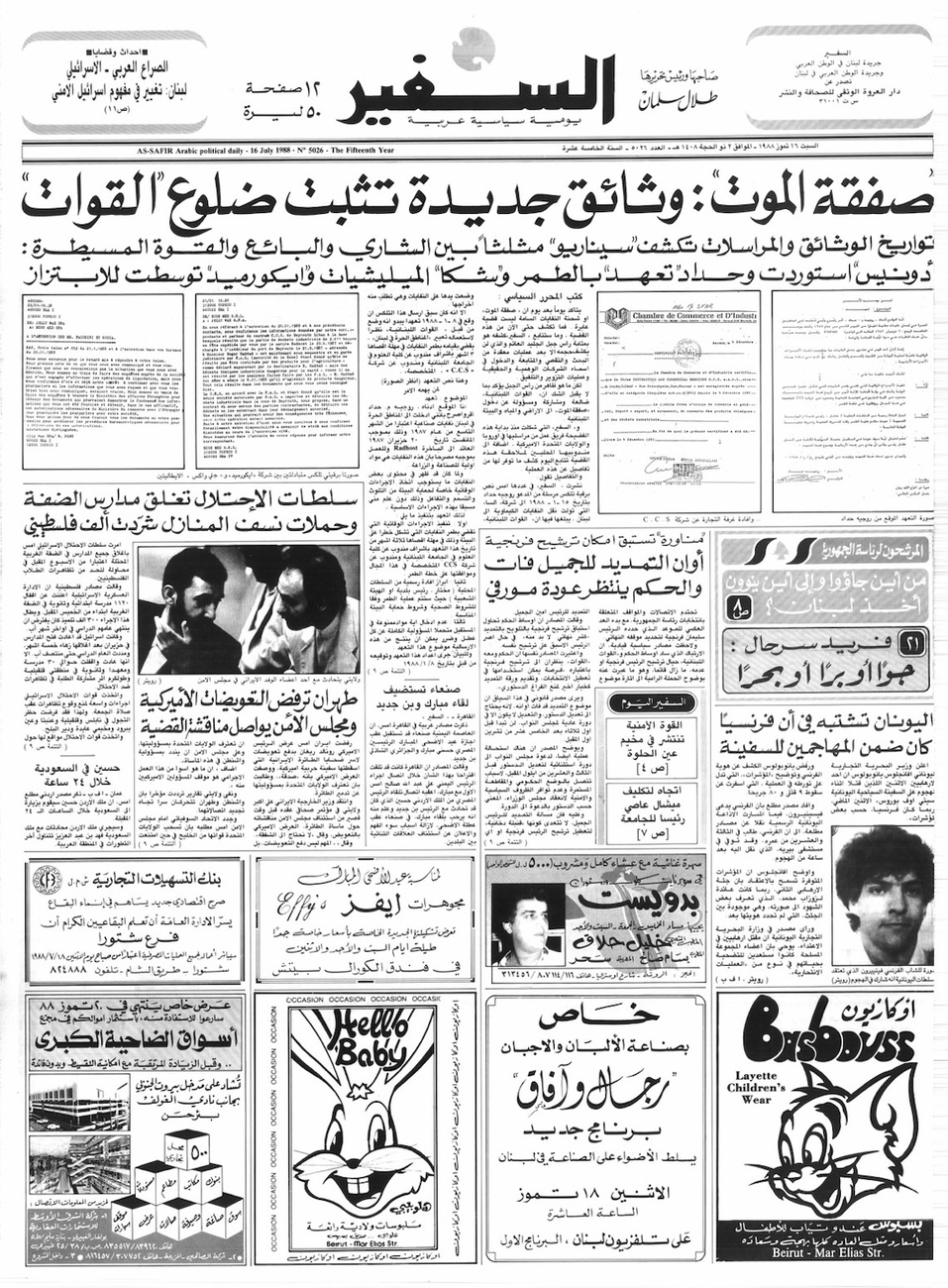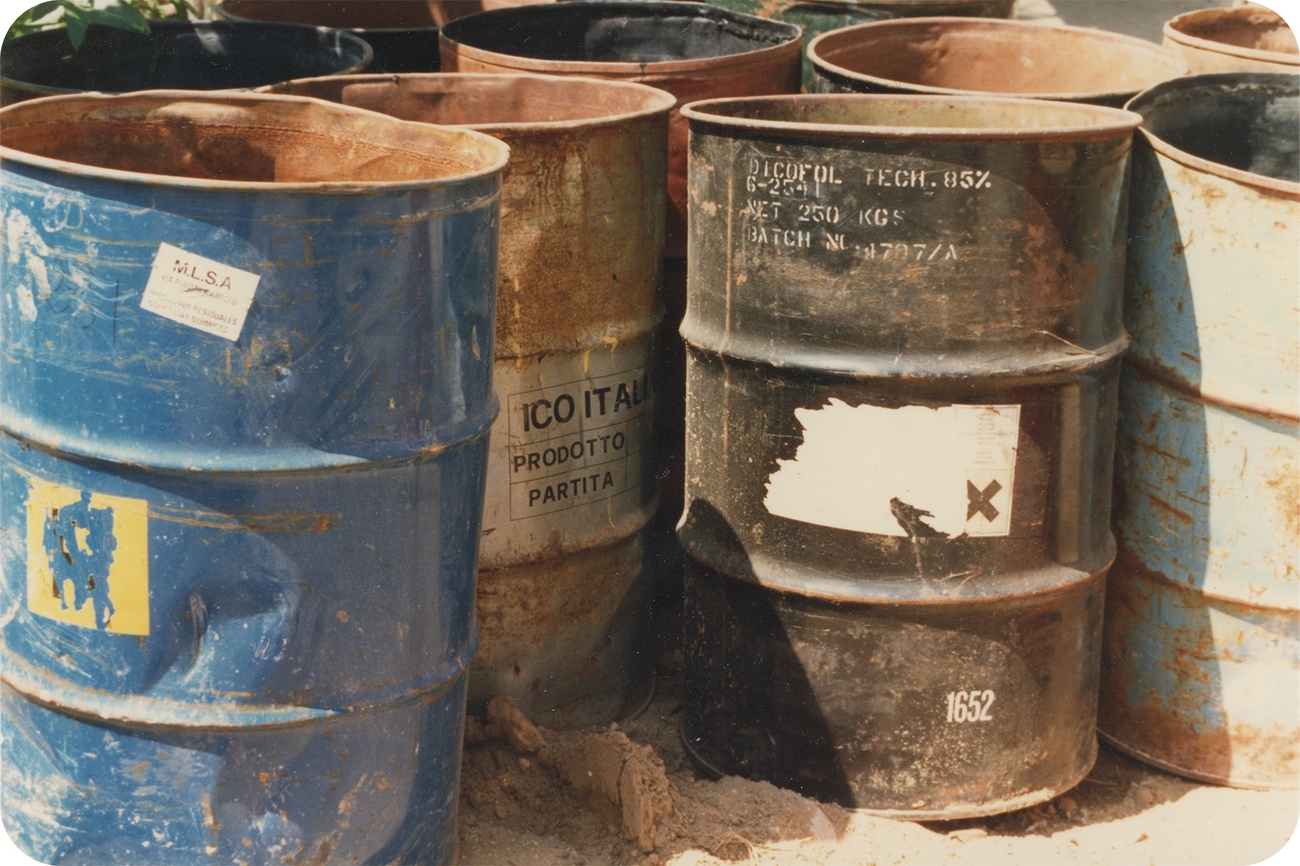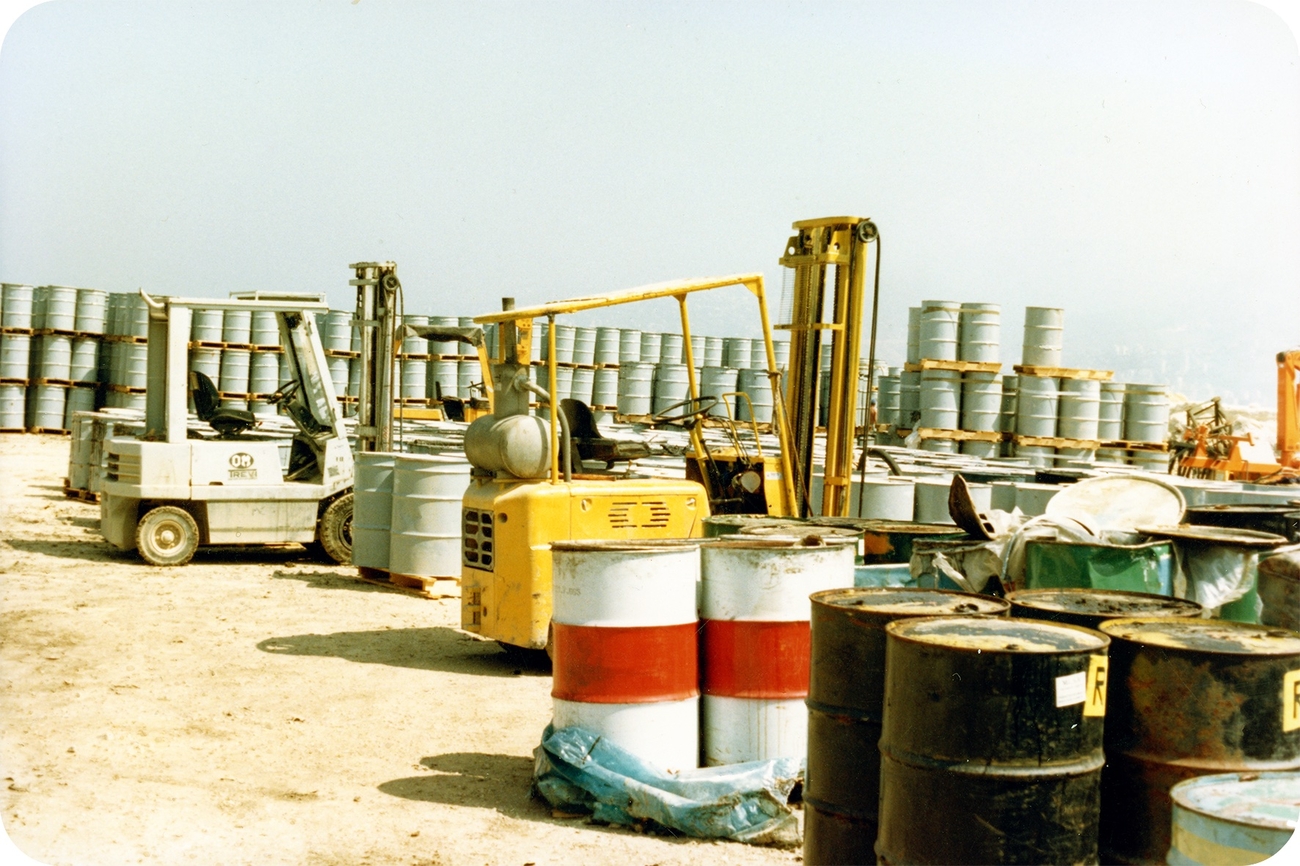Letters to the Editor
To submit a letter: Visit our submission guidelines page
For general inquiries, comments, and feedback: Contact us
To send a story idea or tip: tips@thepublicsource.org
Unbury the Waste
April 27, 2023
Editor’s Note: In 1987, members of the Lebanese Forces militia imported 2,400 tons of toxic waste in barrels from Italy, allegedly in exchange for $22 million, and dumped them in various locations in Lebanon. The Public Source published a two-part investigation detailing this crime and the ongoing cover-up ("Merchants of Death,” August 4, 2022). On March 31, 2023, Lebanon’s Cybercrime Bureau, at the request of the Lebanese Forces, summoned our publisher and editor-in-chief, Lara Bitar, for interrogation. This letter is a response to that summons by Jessika Khazrik, an artist and environmental activist who grew up close to one of the dump sites.
The black dots (●) in the text are clickable to display images provided by the author of this letter.
To the Editor:
Where I come from, and in toxic jurisprudences at large, the investigator is the criminal, and the criminal is the judge. The case of the toxic barrels should have never been closed, and it cannot be closed. The toxic waste needs to be unburied. I am a witness to its environmental degradation. I grew up three minutes from the quarry where the largest number of barrels was stored. This case has been occupying me for nearly half of my life. I will not rest until the waste is removed, and until the toxic environment that was buried or burnt along with the waste is detoxified and rehabilitated with the utmost collective care.
The criminals who brought in, buried, burnt, and submerged the waste need to be held accountable in people’s tribunals — in an active legal apparatus, one that can take nation-states to court — and even under multiple judicial systems at once. These environmental criminals should be made to confess and guide us to the places they contaminated, so that we can unbury the toxic waste that they were bribed to poison us with, which has produced under-examined terminal illnesses and diseases in my hometown. The government — especially the judiciary and the Ministry of Environment — should be held accountable for their falsifications, obfuscation, gaslighting, and complicity.
Despite all their “youthwashing,” the Lebanese Forces are still deploying the very same strategies of denial, falsification, chemical massacre, and infrastructural gaslighting against Lara Bitar and The Public Source, with whom I stand in full solidarity for their thorough and trenchant reporting. The Lebanese Forces is following the same enduring toxic ontology that Lebanese Civil War-born militias all abide by, where the investigator is falsely made to be the criminal, and the criminal is made to be the false judge, in a kleptocratic and ecocidal state.
I recall here a snippet of what ecotoxicologist, herbal pharmacologist, and photographer Pierre Malychef said in a radio interview in September 1998, three years after the Lebanese government shut down the investigation, by force, once again:
“I was finding all this toxic material so quickly. It became a real problem for the Lebanese Forces. If the government returned the toxic waste to Italy, then the Lebanese militias would be obliged to return a big part of the money they got for taking the toxic waste in the first place. This didn't make them very happy, and they retaliated against me.”
Malychef was one of three official investigators of the toxic waste trade. Instead of entrusting and supporting the timely, environmental knowledge Malychef produced and stood for, the herbal pharmacologist and environmental caretaker was repeatedly, violently assaulted, falsely accused of perjury "شاهد زور” and sacrificed as pharmakon by the militia-state.
In 1995, at the age of 65, Malychef was detained by a farce-like jurisprudence, just one day after Said Mirza was abruptly appointed by the government as a new prosecutor on this case. Mirza, who in the ensuing years would become notoriously known as “قاضي شهود الزور” the judge of false witnesses, scapegoated a scientist as a “false witness” for collating and presenting scientific evidence in a governmental investigation that he was officially assigned to co-investigate. Before that, Malychef was physically assaulted twice by members of the Lebanese Forces, once in 1988 at the Beirut Port, and a second time in Bsalim in 1995, in broad daylight.
Malychef has generously and trans-generationally guided me over the past decade in researching ecocide in my hometown. Thanks to his deep care for the environment and diligent knowledge production, we have abundant evidence of the urgency to reopen the criminal toxic waste trade investigation, this time with multi-generational collective demands, plans, and actions for environmental decontamination.
How to retrieve and handle this waste, once exhumed? This is an environmental emergency that the Italian government should fund. The removal and decontamination should be done properly, under the approval of an expert committee made up of scientists from multiple fields, residents, environmental activists, lawyers and engineers.
In a maddening criminal kleptocratic state, we are all terrorized, poisoned, bereaved, and accused of being false witnesses. For us the poison is real; it has killed our families; it still hides in our water and bodies; and it should be removed by those who produced and interred it. We can never stop investigating the toxic history in our environment and bodies, even after we have decontaminated and rehabilitated our towns, quarries, and landfills. Many of the expired chemical waste buried in our environment produce exposomes that outlive us.
All generations will remember; #UnburyTheWaste. I let the documents below evince their power to attest.

Front page of Assafir newspaper on July 17, 1988, with the following headline and documentary proof: "The Death Trade: New Documents Prove the Involvement of the 'Lebanese Forces.'" (Click [note:1] for details)
Image taken by Pierre Malychef at the 5th basin of the Beirut Port in August 1988 when the Lebanese Forces were allegedly sending the waste back to Italy on board four ships. (Click [note:2] for details)
Image taken by Pierre Malychef in 1995 of barrels from the ca. 15,800 toxic waste trade. (Click [note:3] for details)
Jessika Khazrik
Artist, technologist, writer, and DJ who grew up next to one of the main dumping sites of this toxic waste trade. She has been active in struggles for environmental justice since early adolescence and more particularly in the last decade on the toxic waste trade above through the ‘ حقل البراميل الزرئ The Blue Barrel Grove’ project. She is currently a fellow at the Helmholtz Center for Environmental Health and a Visiting Artist Fellow at the Academy of Fine Arts, Nuremberg.
Neutrality as a Shield From Violence
June 9, 2021
To the Editor:
“Lebanon First:” On the Politics of Neutrality on a Moving Train” (May 21). Neutrality is a desire to shield Lebanon from further instability and political violence. The two and a half decades of French Mandatory rule are unrelated to that stance.
That Lebanon has been a battlefield for regional war for most of its independent history shows the need to disassociate, but not to ignore or — as Bitar notes — “endorse … the settler-colonial project in Palestine.” Any concerned citizen should stand for Palestinian political dignity and economic rights, and that begins with addressing how Lebanon treats its own Palestinian refugees. Yet the violent consequences of military involvement in the Palestinian cause are within living memory, and the PLO’s battles in Lebanon against Israeli forces in the early 1970s quickly contributed to ungovernability and breakdown. Bitar’s perspective that “neutrality is oriented toward submission” does little to differentiate extremist stances of isolation and sectarianism from citizens demanding a proactive policy of disassociation.
The author further claims that “neutrality … is another weapon brandished by our former colonizers … crushing our resistance.” The “weapon” is, in fact, pointed in the other direction. The 2012 Baabda Declaration of disassociation from the Syrian war was signed by Hezbollah, yet never implemented. Hezbollah denied the “rational national stance” that Bitar dismisses, further contributing to Lebanon’s political paralysis-turned-collapse.
On the question of sovereignty. Disassociation does not imply, in any way, violence against refugees. That accusation aside, if the starting point to sovereignty begins with “imagined nation-state borders” then the conversation becomes one built on Marxist economics and political anarchy rather than Lebanon’s reality. Whether or not Lebanon is a “colonial project built on a series of national myths,” a century has passed where the foundation — flawed and in desperate need of reform — formed our borders. And this may be the crux of the issue, at least in terms of how to define and even describe sovereignty when a state lacks control over its decision-making capabilities, let alone its sensitive sites.
The author also links state authority to “sever[ing] … organic ties with people across Greater Syria.” Yet a Greater regional politics rid of tyranny, zealotry and paramilitary proxy would usher in those natural ties that once defined our economics and trade. A reversal — or revision — of that history will not. The author’s subsequent tying of sovereignty to “pav[ing] the way for Zionism … further succumb[ing] … any possibility of political and economic sovereignty as a people” exposes more false associations of state authority to Jewish nationalism and colonialism, and false connotations of Lebanese independence and Zionism.
The disagreement is perhaps best summed up by the following. On one side, a state under attack, hijacked by proxy and unable to deliver political agency and destiny. The other, a state born in error, its flaws permanent unless unraveled to its core and dismantled. At hand is either a yearning for monopoly of violence through a sole legitimate army and monopoly of power through state institutions, or a deriding of both through anarchic politics and economics. We can either choose to see 1970-1975 as the years that led to our current fate, or look back to 1920, where founding myth and European intrusion turned to our modern curse.
Ronnie Chatah
Host of The Beirut Banyan podcast
The writer is the son of assassinated former minister Mohamad Chatah.

Front page of Assafir newspaper on July 17, 1988, with the following headline and documentary proof: "The Death Trade: New Documents Prove the Involvement of the 'Lebanese Forces.'"
The subheading reads, "Dates of the documents and correspondences reveal a triad scenario between the buyer, the seller, and the controlling power: "Adonis" imported, Haddad "pledged" to bury the waste and "blamed" the militias," and "Ecormid" mediated the blackmail.

Image taken by Pierre Malychef at the 5th basin of the Beirut Port in August 1988 when the Lebanese Forces were allegedly sending the waste back to Italy on board four ships.
Around 5,000 barrels were brought in from the trade of ca. 15,800 in addition to 5,000 new light gray barrels, as documented by the three scientists-official investigators of the case. Some of the waste was emptied and mixed in the new barrels, then loaded onto the ships, three of which were sunk and never reached Italy.

Image taken by Pierre Malychef in 1995 of barrels from the ca. 15,800 toxic waste trade. Some of the worn barrels contained Dicofol, a highly toxic pesticide whose production and use are banned internationally under the Stockholm Convention.
Dicofol is a nerve poison that can also lead to skin and eye toxic reactions in humans and impair the fertility of several birds, reptiles, aquatic invertebrates and algae. Since Dicofol can be stored in fatty tissue, intense activity or starvation may re-catalyze the chemical, resulting in the reappearance of toxic symptoms long after exposure